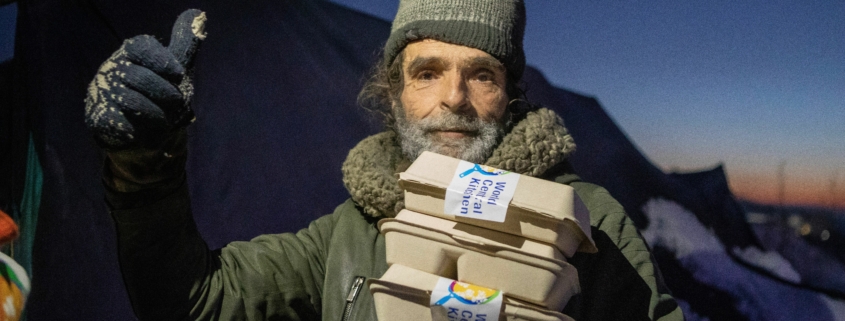SAMU First Response: World Central Kitchen
For those impacted by natural, humanitarian and community crises, the list of needs at the frontlines can be long. Shelter, medical attention and water top the list, but perhaps nothing is more restorative than a hot meal. That’s the love language World Central Kitchen (WCK) speaks.
Since a massive earthquake rocked Haiti in 2010, WCK began working alongside local chefs in the aftermath of disasters to provide meals to those affected. They determine where to deploy based on a number of factors, some of which include the scale of the disaster, the number of people affected, and existing governmental and NGO response.
“Since those early days our journey has taken World Central Kitchen all over the world”, said founder José Andrés. “We fed an island after Hurricane Maria destroyed Puerto Rico. We fed tens of millions struggling with the Covid-19 pandemic. We put boots on the ground when a blast devastated Beirut, bushfires ripped through Australia, and a volcano transformed a Spanish island”.
In fact, SAMU’s home country has been on the receiving end of aid from WCK’s more than once, as recently as January 2021. Snowstorm Filomena resulted in unprecedented snowfall across central Spain, trapping thousands. While SAMU teams worked on the emergency response, assisting with removing downed trees, WCK mobilized an emergency kitchen in Madrid to push in with food. Cooking began before the roads were even cleared. Relief teams followed snow plows for 10 hours, delivering 6,000 meals to hospitals, snowed-in seniors, and other vulnerable communities.
Fiona Donovan, WCK’s Director of Relief Operations, said that once the organization decides to activate, their Relief Team moves quickly, engaging with the local community to understand where the gaps are, and how we can best provide support”. But, she added, they always strive to do that prepared.
“Part of our mission is to always assess with food, so that we are never on the ground empty handed without a hot meal or sandwich to offer the people we meet”, Donovan said. This was demonstrated most recently after a destructive, near Category 5 hurricane made landfall September 28th along the west coast of Florida in the United States.
“For Hurricane Ian, we arrived several days before the storm to scout kitchen locations, began bringing in product and cooking equipment, and started making sandwiches so we’d be ready with meals as soon as it was safe to go out”.
Donovan explained that WCK prepares to deploy by staging equipment, like food trucks, trailers and massive paella pans, in warehouses across the country. They also maintain a roster of temporary staff and volunteers globally.
Tampa Bay Times staff reporter, Helen Freund, recently volunteered with the organization during Hurricane Ian. She shared her experience in an article published in that paper on October 1st.
“In the first two days [after] World Central Kitchen hit the ground, the group served more than 45,000 hot meals and 14,000 sandwiches to victims of the storm”, Freund reported. “Disaster relief is physical work. It is both much harder than you expect and more humbling. The staff from World Central Kitchen were some of the kindest, hardest-working people I have ever met”. Another factor that contributes to a quick response, Donovan said, are the partnerships WCK has established with local restaurant partners and chefs.
“WCK has a large network of restaurants and chefs who have been working with us over the years. Everywhere we go, we find new restaurant partners locally who are eager to join our response to serve their communities”, She said. “It can take WCK a few days to source product and begin cooking hot meals, so leveraging the capacity and skills of local chefs and restaurant partners allows us to begin feeding immediately following a disaster”.
Chef Andrés stressed that these local partnerships also serve another purpose. “We don’t just deliver raw ingredients and expect people to fend for themselves”, Andrés explained. “And we don’t just dump free food into a disaster zone: We source and hire locally wherever we can, to jump-start economic recovery through food”.
Donovan said that providing additional aid in the form of jump-starting economic recovery is a critical component of WCK’s work. This is why the organization hires local staff and restaurant partners everywhere they go. In Florida, for example, WCK has hired more than 20 local staff and engaged hundreds of volunteers to support the response to Hurricane Ian there.
“By bringing on local community members, we are financially supporting folks affected by disasters who have suffered economic losses as a result of the event”, She said. “Local staff and volunteers also have a strong working knowledge of the region, so they help us to understand where the gaps are, and which communities are the most vulnerable so we can get meals to those who need them the most”.
Perhaps that’s not surprising given WCK founder Jose Andrés’ belief that food, in the wake of a disaster, restores a sense of community.
“We can put people back to work preparing it, and we can put lives back together by fighting hunger”, Chef Andrés said. “Cooking and eating together is what makes us human”.
To date, World Central Kitchen has served more than 200 million nourishing meals around the world, and, in Partnership with SAMU, 8,170 meals to arriving migrants in the Washington, D.C. area.
By Amy Hammond. Manager of partnerships and developement for SAMU First Response






